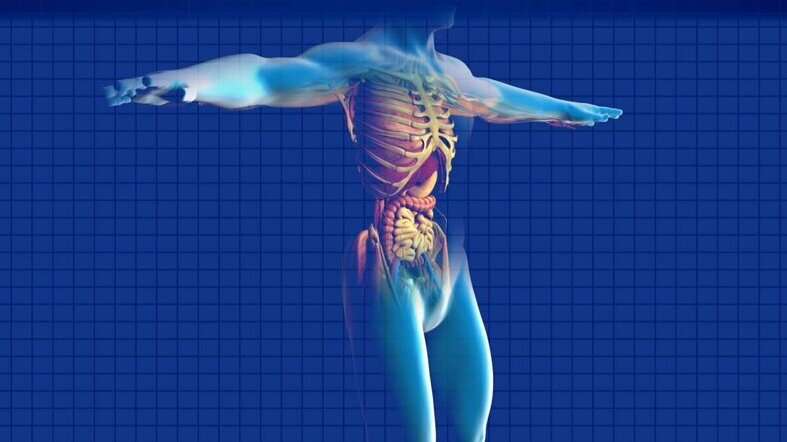This article has been reviewed according to Science X's editorial process and policies. Editors have highlighted the following attributes while ensuring the content's credibility:
fact-checked
peer-reviewed publication
trusted source
proofread
'Cancer-cooling' protein puts bowel cancer on ice

A protein in the immune system can be manipulated to help overcome bowel cancer, according to new research from The Australian National University (ANU). The research is published in Science Advances.
Bowel cancer claims more than 100 lives in Australia each week, yet around 90% of cases can be successfully treated if detected early.
According to lead author Dr. Abhimanu Pandey, from ANU, the protein, known as Ku70, can be activated or "turned on" like a light switch by using a combination of new and existing drugs.
"In its activated state, the protein acts like a surveillance system, detecting signs of damaged DNA in our cells," Dr. Pandey said.
"DNA is the genetic code of life. Damaged DNA is a sign of danger that can turn healthy cells into cancer cells.
"Our research shows that Ku70 can 'cool off' cancer cells and mop up damaged DNA. The protein prevents the cancer cells from becoming more aggressive and spreading throughout the body, essentially deactivating them and keeping them in a dormant state."
Bowel cancer is the fourth most diagnosed cancer in Australia. It's estimated one in 20 people will be diagnosed with bowel cancer by the age of 85.
Under the National Bowel Cancer Screening Program, Australians aged between 50 and 74 receive a free bowel screening test every two years—an effective measure to promote early detection and treatment.
Although the risk of developing bowel cancer is higher in people aged over 50, an increasing number of younger Australians are being diagnosed with the disease. One in nine new bowel cancer cases now occur in Australians under the age of 50.
Professor Si Ming Man, also from ANU, said future bowel cancer screening methods could include checking the levels of Ku70 in pre-cancerous polyps, abnormal growths of tissue found in the colon, before healthy cells turn cancerous.
"Our research shows Ku70 is a good immune biomarker, meaning it helps us predict who will fare better or worse after being diagnosed with bowel cancer," Professor Man said.
Ahead of World Cancer Day on 4 February, the ANU researchers are calling for people of all ages to be aware of the signs and symptoms of bowel cancer.
"We know early detection and treatment is vital to overcoming not only bowel cancer, but potentially other cancers as well," Professor Man said.
"We hope the cancer research conducted at ANU helps raise awareness of cancer prevention, detection, and treatment on this important day."
More information: Abhimanu Pandey et al, Ku70 senses cytosolic DNA and assembles a tumor-suppressive signalosome, Science Advances (2024). DOI: 10.1126/sciadv.adh3409. www.science.org/doi/10.1126/sciadv.adh3409



















